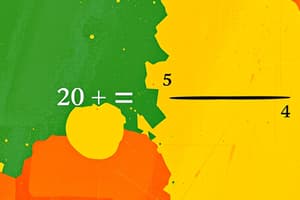Podcast
Questions and Answers
What does the Reflexive Property state?
What does the Reflexive Property state?
- If a=b and b=c, then a=c
- If a=b, then a+c=b+c
- a=a (correct)
- If a=b, then b=a
What does the Symmetric Property state?
What does the Symmetric Property state?
- If a=b, then b=a (correct)
- If a=b, then a+c=b+c
- a=a
- If a=b and b=c, then a=c
What does the Transitive Property state?
What does the Transitive Property state?
- a=a
- If a=b, then a+c=b+c
- If a=b and b=c, then a=c (correct)
- If a=b, then b=a
What does the Substitution Property entail?
What does the Substitution Property entail?
What does the Addition Property of Equality state?
What does the Addition Property of Equality state?
What does the Subtraction Property of Equality state?
What does the Subtraction Property of Equality state?
What does the Multiplication Property of Equality state?
What does the Multiplication Property of Equality state?
What does the Division Property of Equality state?
What does the Division Property of Equality state?
What is the Additive Identity?
What is the Additive Identity?
What is the Additive Inverse?
What is the Additive Inverse?
What is the Multiplicative Identity?
What is the Multiplicative Identity?
What does the Multiplicative Property of Zero state?
What does the Multiplicative Property of Zero state?
What does the Multiplicative Inverse involve?
What does the Multiplicative Inverse involve?
What does the Commutative Property signify?
What does the Commutative Property signify?
What does the Associative Property entail?
What does the Associative Property entail?
What is the Closure Property?
What is the Closure Property?
What does the Distributive Property state?
What does the Distributive Property state?
Flashcards are hidden until you start studying
Study Notes
Reflexive Property
- States that a number is equal to itself, expressed as a = a.
Symmetric Property
- If one quantity is equal to another (a = b), then the second quantity is equal to the first (b = a).
Transitive Property
- Establishes a chain of equality: if a = b and b = c, then it follows that a = c.
Substitution Property
- Allows for replacing one quantity with another equivalent quantity in equations or expressions: if a = b, then a can be substituted for b.
Addition Property of Equality
- Adding the same value to both sides of an equation keeps the equation balanced: if a = b, then a + c = b + c.
Subtraction Property of Equality
- Subtracting the same value from both sides of an equation maintains equality: if a = b, then a - c = b - c.
Multiplication Property of Equality
- Multiplying both sides of an equation by the same quantity preserves equality: if a = b, then ac = bc.
Division Property of Equality
- Dividing both sides of an equation by the same non-zero quantity keeps the equation balanced: if a = b, then a/c = b/c.
Additive Identity
- States that adding zero to any number will not change its value: any number + 0 = that number.
Additive Inverse
- The sum of a number and its opposite equals zero: x + (-x) = 0.
Multiplicative Identity
- States that multiplying any number by one does not change its value: x * 1 = x.
Multiplicative Property of Zero
- Any number multiplied by zero results in zero: a * 0 = 0.
Multiplicative Inverse
- Involves multiplying a number by its reciprocal to form one: if 3/4 = x, then (4/3) * (3/4) = x * (4/3).
Commutative Property
- The order of addition or multiplication does not affect the sum or product: a + b = b + a.
Associative Property
- Changing how numbers are grouped does not change the result in addition or multiplication: (7 + 4) + 8 = 7 + (4 + 8).
Closure Property
- The sum or product of any two real numbers will always yield another real number.
Distributive Property
- Indicates how multiplication distributes over addition: a(b + c) = ab + ac.
Studying That Suits You
Use AI to generate personalized quizzes and flashcards to suit your learning preferences.




